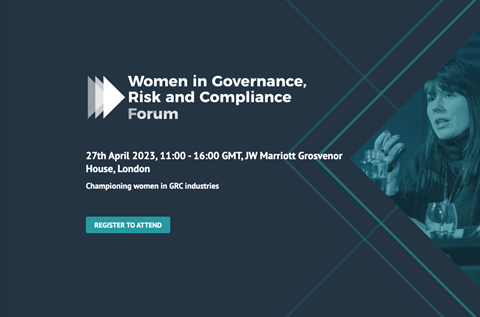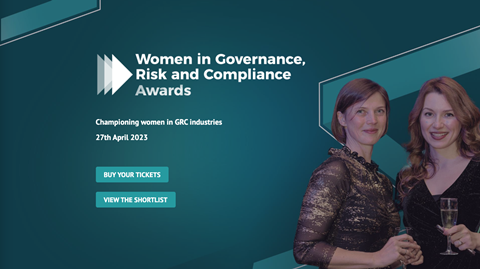We were delighted to have GRC expert, Shabana Imran speaking at Women in Governance, Risk and Compliance (GRC) Forum, recently.
Shabana Imran is Executive Director in Data Management (GRC) at Standard Chartered Bank. In this role, Shabana monitors and assures the global data management framework is effectively and appropriately implemented globally in Group Functions.
Leveraging two decades of diverse global experience in financial industries across data management, IT risk management, and multiple other sectors, Shabana has a wealth of expertise in front ending discussions with key regulators around the world.
Shabana spoke at Women in GRC Forum to discuss how women are inspiring women and why female representation in leadership is critical for the future.

We caught up with Shabana for more insight on these issues and her career to date following her talk.
Could you outline your professional pathway so far?
I had a break through immediately after finishing my studies at the university, when I was interviewed by General Electric (GE) in my campus back in India, and I was selected as a process associate.
During my tenure with GE, I gained experience as a member of a professional team interacting directly with clients. The job was customer service oriented; it enhanced my technical skills in process improvement and led to me acquiring my Six Sigma certifications.
After five years, I moved into Standard Chartered Bank (SCB) in India in the Technology function as a Six Sigma (Quality) Manager, for a short while. I was offered an opportunity to be part of the Wholesale Bank (then) re-engineering team in Singapore, where I acquired significant experience in successfully transforming business processes and applications.
I had already started to move up the ladder and with this success I received another offer within the Technology Infrastructure space, where I led the overall operational governance of the function. Technology Risk was an emerging branch at this time, with very few technologists opting for it. This was interesting for me and I literally rode the wave of first mover’s advantage.
I set up the Technology Infrastructure Risk function from scratch and as the function saw benefits, we expanded the team to support the whole of the Global Technology Services function over a few years.
By now, it was time for me to move to London with family and I was fortunate to be able to move within SCB. I led the Global Technology Regulatory Programs delivering regulatory transformation programs. My most recent move came three years ago with my current team where I lead the GRC for the Global Data Management team, as part of the second line of defence within the Compliance function.
Could you outline the current employment landscape that women currently face, in terms of pay gaps, uneven opportunities for advancement and unbalanced representation in decision-making roles?
Despite significant progress made in recent decades, women still face challenges in the workplace when it comes to pay, opportunities for advancement, and representation in decision-making roles.
In my opinion, some road blocks of the current employment landscape across majority of the industries for women include:
Lack of career breakthrough and advancement
Women face barriers in early career break-through and career advancement. These include: apprehension in applying for job opportunities in non-stereo typical disciplines; limited access to professional training / support & skills in their early career; limited access to mentoring and sponsorship; lack of career guidance or support during various phases of life of a woman like pregnancy / maternity, motherhood, menopause etc; lack of flexibility in work arrangements, and biases (sometimes unconscious bias) against working mothers, married women, women of colour, and women from minority ethical backgrounds. Women are underrepresented in higher-level positions and leadership roles, particularly in traditionally male-dominated industries.
Unbalanced representation in decision-making roles
Women are underrepresented in decision-making roles, for example across corporate boards and political leadership positions. This lack of representation can lead to policies and decisions that do not take into account women’s perspectives and needs. Whilst women are making progress / advancing in diverse professions, the personnel in leadership roles in such professions need a balanced perspective to support and encourage women in their career. This can be addressed with representation of women with appropriate power, authority & position.
Passive oppression
This is a very sensitive, subtle and sometimes unintentional behaviour that women face today. Work-based social gathering is an example where the comfort level of women colleagues is ignored. Women in the early stages of their career can be unsure of how to address and express discomfort in certain professional scenarios.
Lack of education to all staff of such scenarios can lead to women not being able to exhibit their full competence and expertise. In some cases, women whose job role is to challenge personnel in authority can be intimidated by the person in leadership roles, though this is not limited to women alone, this can be exacerbated for women.
Overall, while progress has been made, women still face significant challenges in the workplace. Addressing these challenges requires a concerted effort from employers, policymakers, and society at large.
What steps do organisations need to take in order to address these disparities and start making tangible progress?
Many large organisations have started to put this issue at the top of the agenda, which is great. However, in my opinion, this has not percolated through all organisations of all sizes and industries.
Tone from the top
Corporates should set the right ‘tone from the top’. Board sponsorship and leadership commitment towards women in their organisations is one of the first and key steps. Some examples which I have seen have worked very well include: increasing women leaders; providing an inclusive and flexible work environment; encouraging returning women from their career break; and promoting gender diversity in recruitment and hiring etc.
Staff education and awareness
Every people leader within the organisation should be given training and support towards how and what to consider with diverse people / staff; how to be conscious of unconscious bias; how to handle special situations like maternity, menopause etc. Increasing awareness in these topics can avoid many of the problems.
Wellbeing Support Group
Such groups can offer mental and social help to colleagues, and give staff a place to reach out and obtain support for the challenges they may face. Sharing experiences with others can provide solutions to other staff members’ problems.
Sow seeds for the future
We need to reach out to our community of young girls across diverse backgrounds as they start their careers, and give them early career guidance. This can lead and encourage girls to expand their thought process and explore further opportunities with fewer inhibitions. Extending ‘mentoring and coaching’ opportunities beyond the organisation also can encourage women in various stages of their career.
By taking such steps, organisations can encourage the women leaders of tomorrow.








































No comments yet